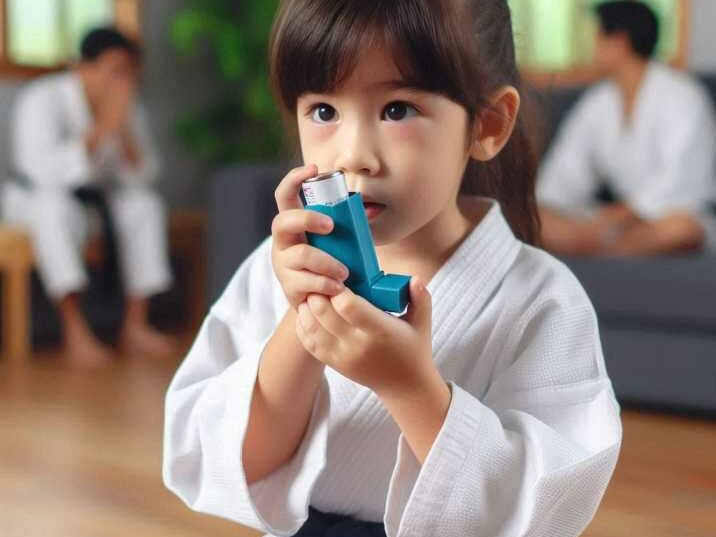Introduction
Table of Contents
As a parent, you might be wondering, “Will martial arts help my child with asthma?” It’s a common concern, given the challenges asthma can pose for physical activities. Martial arts, however, may offer surprising benefits for children with asthma. This article will explore how martial arts can be a supportive and effective activity for managing asthma, improving overall health, and boosting confidence in children.

Understanding Asthma and Its Challenges
Asthma is a chronic condition that affects the airways, making breathing difficult. It can be triggered by various factors such as allergens, physical exertion, or even stress. For children, asthma can be particularly challenging as it can limit their participation in physical activities, which are crucial for their growth and development.
Key Facts About Asthma
- Prevalence: Asthma affects about 8.4% of children in the United States.
- Symptoms: These include wheezing, coughing, shortness of breath, and chest tightness.
- Triggers: Common triggers include pollen, dust, cold air, and exercise.
Managing asthma involves avoiding triggers, using medication as prescribed, and engaging in activities that promote respiratory health without causing exacerbations.
How Martial Arts Can Help Manage Asthma
Building Respiratory Strength
Martial arts can help children with asthma by building their respiratory strength. Controlled breathing techniques are integral to most martial arts disciplines, helping to improve lung capacity and control.
Stress Reduction
Another significant benefit is stress reduction. Stress is a common asthma trigger, and martial arts, through meditation and mindfulness practices, can help children manage stress effectively.
Enhancing Cardiovascular Health
Regular practice of martial arts improves cardiovascular health, which is beneficial for children with asthma. Better cardiovascular health means improved stamina and endurance, making it easier to manage asthma symptoms during physical activity.
Types of Martial Arts Suitable for Children with Asthma
Karate
Karate focuses on precise movements and controlled breathing, making it a good option for children with asthma. The discipline encourages mindfulness and stress relief.
Taekwondo
Taekwondo emphasizes high-energy techniques and cardiovascular fitness. It’s excellent for building endurance and improving overall fitness, which can help manage asthma symptoms.
Aikido
Aikido is a martial art that involves more fluid and less intense movements. It focuses on harmony and balance, which can be less physically demanding and more suitable for children with severe asthma.
Judo
Judo can be beneficial due to its emphasis on technique over strength. It encourages controlled breathing and can improve overall physical fitness without excessive strain.
Breathing Techniques in Martial Arts
Diaphragmatic Breathing
Diaphragmatic breathing, or “belly breathing,” is often taught in martial arts. This technique helps improve lung efficiency and control, which is particularly beneficial for children with asthma.
Controlled Exhalation
Martial arts teach controlled exhalation, helping children learn to breathe out slowly and steadily. This can prevent the hyperventilation often associated with asthma attacks.
Breath Counting
Breath counting, used in many martial arts, can help children focus on their breathing patterns, reducing anxiety and promoting relaxation, which is crucial for asthma management.
Improving Physical Fitness
Strength and Flexibility
Martial arts improve both strength and flexibility. Strengthening the muscles around the chest and back can support better breathing, while flexibility can reduce tension in the body.
Endurance
Building endurance is key for children with asthma. Martial arts provide a full-body workout that enhances cardiovascular fitness, helping children become more resilient to asthma symptoms during physical exertion.
Coordination and Balance
Improved coordination and balance from martial arts can also contribute to overall physical health, making everyday activities easier and less likely to trigger asthma symptoms.
Mental and Emotional Benefits
Confidence and Self-Esteem
Learning martial arts can significantly boost a child’s confidence and self-esteem. Achieving new belts and mastering techniques provides a sense of accomplishment that can be particularly empowering for children with asthma.
Discipline and Focus
Martial arts require discipline and focus, skills that can be beneficial in all areas of life. These qualities help children with asthma manage their condition more effectively by adhering to treatment plans and being mindful of their triggers.
Stress Management
As mentioned earlier, stress management is a crucial benefit of martial arts. The mindfulness and meditation practices integrated into martial arts training help children cope with stress, a common trigger for asthma.
Safety Precautions and Tips
Consult with Healthcare Providers
Before enrolling your child in martial arts, consult with their healthcare provider. They can offer specific advice tailored to your child’s asthma severity and overall health.
Choose the Right Martial Art
Not all martial arts are suitable for every child. Consider your child’s interests and physical capabilities when choosing a martial art. It’s also essential to find a school with instructors experienced in working with children with asthma.
Monitor Asthma Symptoms
Regularly monitor your child’s asthma symptoms. Ensure they use their medication as prescribed, especially before and after classes. Keeping a symptom diary can help track how martial arts impact their asthma.
Ensure a Safe Environment
Ensure the martial arts school provides a safe environment. This includes proper ventilation, clean facilities, and instructors trained in first aid and emergency asthma response.
Table of Information:
| Subtopic | Description |
|---|---|
| Understanding Asthma and Its Challenges | Explains asthma, its prevalence, symptoms, and triggers. |
| How Martial Arts Can Help Manage Asthma | Discusses the benefits of martial arts for respiratory strength, stress reduction, and cardiovascular health. |
| Types of Martial Arts Suitable for Children with Asthma | Details various martial arts like Karate, Taekwondo, Aikido, and Judo, and their suitability for children with asthma. |
| Breathing Techniques in Martial Arts | Highlights specific breathing techniques such as diaphragmatic breathing, controlled exhalation, and breath counting. |
| Improving Physical Fitness | Describes how martial arts enhance strength, flexibility, endurance, coordination, and balance. |
| Mental and Emotional Benefits | Explores the boost in confidence, discipline, focus, and stress management from practicing martial arts. |
| Safety Precautions and Tips | Provides advice on consulting healthcare providers, choosing the right martial art, monitoring symptoms, and ensuring a safe environment. |
| Conclusion | Summarizes the overall benefits of martial arts for children with asthma. |
| Frequently Asked Questions (FAQs) | Answers common questions regarding martial arts and asthma, addressing concerns and offering practical advice. |
Conclusion
So, will martial arts help your child with asthma? The answer is a resounding yes. Martial arts can offer numerous physical, mental, and emotional benefits that can help manage asthma symptoms, improve overall health, and boost confidence. With proper precautions and the right approach, martial arts can be a fantastic activity for children with asthma.
Frequently Asked Questions (FAQs)
1. Can children with severe asthma practice martial arts?
Yes, but it’s crucial to choose a suitable type of martial art and consult with a healthcare provider to ensure it is safe for your child.
2. What are the best martial arts for children with asthma?
Karate, Taekwondo, Aikido, and Judo are excellent options due to their focus on controlled breathing and overall fitness.
3. How can martial arts improve my child’s asthma management?
Martial arts improve lung capacity, cardiovascular health, and stress management, all of which are beneficial for managing asthma.
4. Are there any risks involved in martial arts for children with asthma?
While there are risks associated with any physical activity, choosing the right martial art and ensuring proper precautions can minimize these risks.
5. What should I look for in a martial arts school for my child with asthma?
Look for a school with experienced instructors, a clean and well-ventilated environment, and a focus on safety and inclusivity.


